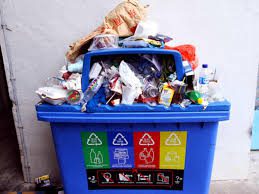Waste recycling challenges for businesses refer to the difficulties and obstacles that businesses or companies encounter when trying to implement effective recycling practices within their operations. These challenges includes:
1. Cost Concerns: One of the primary challenges businesses face when it comes to recycling is the cost. Setting up recycling programs, investing in recycling bins, and educating employees all require financial resources. In the short term, these expenses can seem burdensome.
However, it’s essential to recognize that in the long run, recycling can lead to cost savings through reduced waste disposal fees and potential tax incentives for environmentally responsible practices.
2. Lack of Infrastructure: Not all areas have robust recycling infrastructure in place. This lack of infrastructure can make it difficult for businesses to recycle effectively. They may struggle to find recycling facilities or transportation options for their recyclables.
To overcome this challenge, businesses can collaborate with local governments and recycling organizations to advocate for better infrastructure or explore alternative recycling solutions, such as partnering with recycling companies.
3. Complex Regulations: Recycling regulations vary widely from one location to another. Navigating these complex regulations can be a headache for businesses, especially those with multiple locations or those operating across borders.
The key to addressing this challenge is to stay informed about local recycling laws and regulations. Many governments provide resources and guidelines for businesses to comply with recycling laws.
4. Employee Engagement: Getting employees on board with recycling initiatives can be challenging. Some employees may not fully understand the importance of recycling, while others might find it inconvenient or time-consuming.
To tackle this challenge, businesses can invest in employee education and engagement programs. Simple and regular communication about the benefits of recycling and easy-to-use recycling bins can make a significant difference.
5. Supply Chain Considerations: Businesses often face challenges in their supply chains when it comes to recycling. They may work with suppliers that use excessive packaging or materials that are not easily recyclable.
To address this, businesses can engage with their suppliers to encourage more sustainable and recyclable packaging options. Collaboration throughout the supply chain can lead to positive changes.
6. Consumer Expectations: Consumers are increasingly conscious of businesses’ environmental practices. Meeting these expectations can be a challenge, as businesses must not only recycle but also communicate their efforts effectively.
Transparency and authenticity are key here. Businesses should be honest about their recycling practices and strive for continuous improvement.
Recycling challenges for businesses are real, but they are not insurmountable. By addressing cost concerns, working to improve infrastructure, navigating regulations, engaging employees, considering supply chain sustainability, and meeting consumer expectations, businesses can successfully navigate the green maze of recycling.
It’s not just about environmental responsibility; it’s also about creating a positive image and building a sustainable future for both the business and the planet.
Read Also: What Are Recycling Rates and How to Achieve High Recycling Rates
The Consequences of Waste Recycling Challenges

Recycling has long been heralded as an environmentally responsible practice, contributing to the conservation of resources and the reduction of waste. However, the world faces significant consequences due to recycling challenges.
These challenges encompass a wide range of issues, from contamination in recycling streams to insufficient infrastructure. Let delve into the profound consequences that recycling challenges have on the world at large.
1. Environmental Consequences
a. Resource Depletion: When recycling rates fall short, more virgin resources are extracted to meet demand. This can result in habitat destruction, deforestation, soil erosion, and increased greenhouse gas emissions associated with resource extraction.
b. Increased Landfilling: Inefficient recycling systems lead to greater volumes of waste ending up in landfills. Landfills emit harmful greenhouse gases like methane, pollute local air and water, and consume vast tracts of land.
c. Energy Consumption: Recycling typically requires less energy than producing goods from raw materials. Failing to recycle effectively leads to energy-intensive manufacturing processes, contributing to higher carbon emissions and exacerbating climate change.
d. Pollution: Inadequate recycling practices and improper disposal of non-recyclable materials can result in pollution. For example, plastic waste that escapes recycling streams often finds its way into oceans, harming marine ecosystems and wildlife.
2. Economic Consequences
a. Rising Waste Management Costs: When recycling efforts are compromised, waste management costs soar. Municipalities and businesses alike must allocate more resources to deal with increasing waste, potentially leading to higher taxes or fees for the public.
b. Missed Economic Opportunities: The recycling industry presents significant economic potential, offering job creation and revenue generation. Recycling challenges hinder the realization of these economic benefits, missing opportunities for sustainable growth.
c. Resource Price Volatility: As recycling rates remain low, industries reliant on raw materials face increased price volatility due to resource scarcity. This can disrupt supply chains and affect manufacturing costs.
3. Social Consequences
a. Public Engagement: Recycling challenges can erode public confidence in sustainability initiatives. When recycling seems ineffective or inconvenient, individuals may become disheartened, impacting overall engagement in environmental efforts.
b. Health Impacts: The improper recycling or disposal of hazardous materials can have dire health consequences for communities living near waste sites, landfills, or incineration facilities. These areas often experience heightened pollution-related health issues.
c. Community Disparities: Recycling challenges tend to affect marginalized communities disproportionately. These communities often face the brunt of pollution and inadequate waste management, exacerbating social and environmental inequalities.
4. Global Consequences
a. Transboundary Waste Movement: Recycling challenges sometimes lead to illegal dumping or the export of waste to less developed countries. This can result in severe health and environmental repercussions in the receiving regions.
b. International Agreements: International agreements such as the Basel Convention aim to regulate the transboundary movement of hazardous waste. Recycling challenges can strain these agreements and hinder international cooperation on waste management.
The consequences of recycling challenges are extensive and interlinked, affecting the world’s environment, economies, and societies. It is paramount for governments, businesses, and individuals to address these challenges through innovative solutions, improved infrastructure, education, and a collective commitment to responsible waste management and resource conservation.
The world’s ability to confront and surmount recycling challenges will be instrumental in shaping a more sustainable and resilient planet for future generations. To secure a brighter future, we must prioritize recycling as a fundamental component of our global sustainability efforts.
Read Also: Causes of Recycling Contamination and Control Measures
Overcoming Recycling Challenges for Businesses

Recycling challenges may seem daunting, but with determination and the right strategies, businesses can effectively overcome these obstacles and contribute to a greener future. Here are some practical steps to address the recycling challenges discussed earlier;
1. Cost Concerns
a. Long-Term Investment: Consider recycling as a long-term investment in sustainability. Calculate the potential cost savings from reduced waste disposal and factor in any available tax incentives for recycling programs.
b. Resource Allocation: Allocate a specific budget for recycling initiatives. This sends a clear message to employees that recycling is a priority.
2. Lack of Infrastructure
a. Collaboration: Work closely with local governments, recycling organizations, and industry partners to advocate for improved recycling infrastructure in your area.
b. Alternative Solutions: If local recycling options are limited, explore partnerships with private recycling companies that can provide pick-up services or arrange for the transportation of recyclables to suitable facilities.
3. Complex Regulations
a Stay Informed: Regularly update your team about changes in recycling regulations and compliance requirements. Designate someone within your organization to monitor and interpret these regulations.
b. Consult Experts: Seek advice from environmental consultants or legal experts to ensure your business is in full compliance with local and national recycling laws.
4. Employee Engagement
a. Education and Training: Organize regular training sessions to educate employees about the benefits of recycling and how to effectively sort recyclables from trash.
b. Incentives: Consider implementing incentives, such as rewards or recognition programs, to motivate employees to actively participate in recycling efforts.
5. Supply Chain Considerations
a. Supplier Collaboration: Engage with your suppliers and encourage them to adopt more sustainable and recyclable packaging practices. Collaborative efforts can lead to mutually beneficial solutions.
b. Alternative Suppliers: If a supplier consistently ignores sustainability concerns, explore alternative suppliers who prioritize eco-friendly packaging.
6. Consumer Expectations
a. Transparent Communication: Clearly communicate your recycling efforts through various channels, including your website, product packaging, and social media. Use visuals and data to showcase your progress.
b. Consumer Education: Educate your customers about how they can contribute to recycling efforts, such as proper disposal of product packaging or participating in recycling programs.
7. Continuous Improvement
a. Monitor and Measure: Implement a system to monitor and measure the success of your recycling initiatives. Regularly assess recycling rates, cost savings, and environmental impact.
b. Adapt and Innovate: Stay open to new recycling technologies and practices. Embrace innovations that can streamline recycling processes and make them more efficient.
8. Benchmarking and Best Practices
a. Benchmark Against Peers: Research how other businesses in your industry or region tackle recycling challenges. Adopt best practices that align with your business model and goals.
b. Join Industry Initiatives: Participate in industry-specific sustainability initiatives or associations that offer resources, guidance, and a platform for sharing successful recycling strategies.
Overcoming recycling challenges for businesses requires a multifaceted approach that involves financial planning, collaboration, education, and a commitment to continuous improvement.
By adopting these strategies and fostering a culture of sustainability, businesses can navigate the complexities of recycling and make a positive impact on the environment while reaping long-term benefits. Remember, recycling isn’t just about compliance; it’s about creating a more sustainable and responsible future for your business and the planet.
Read Also: The Health Benefits of Meatloaf Seasoning

